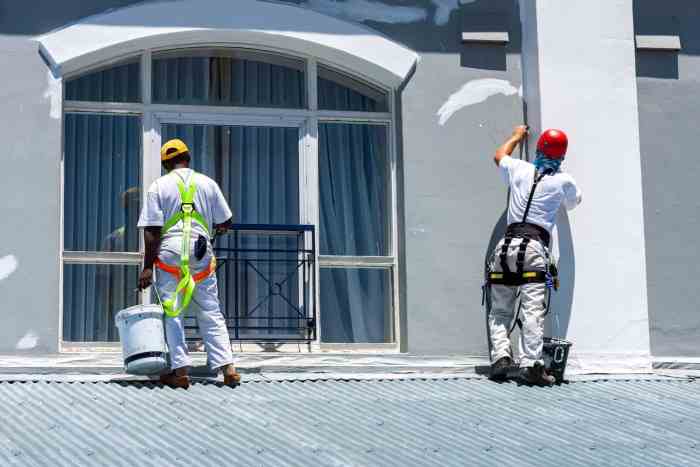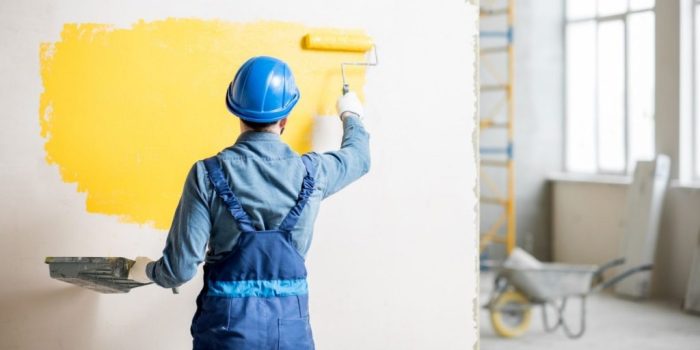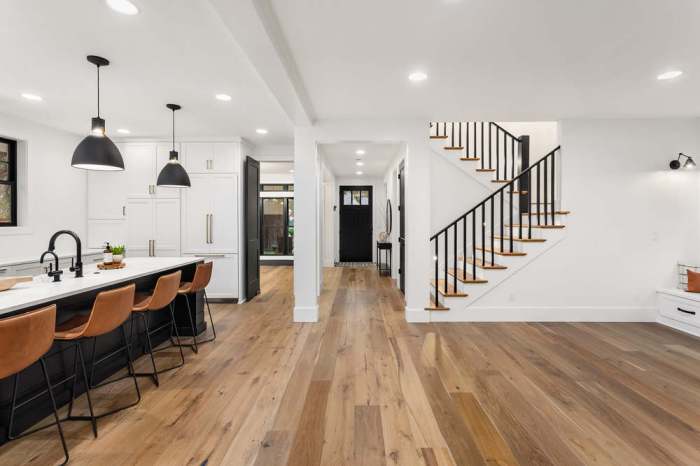Commercial painting contractors play a pivotal role in the construction industry, bringing color and life to a variety of spaces. From office buildings to malls, their expertise transforms ordinary structures into vibrant works of art. Let's dive into the world of commercial painting contractors and uncover the secrets behind their craft.
Overview of Commercial Painting Contractors

Commercial painting contractors play a crucial role in the construction industry, specializing in painting large-scale commercial projects. These professionals are equipped with the expertise and resources necessary to handle the unique demands of commercial painting.
Importance of Hiring Professional Commercial Painting Contractors
- Professionalism: Commercial painting contractors bring a level of professionalism to the job, ensuring quality workmanship and adherence to deadlines.
- Experience: With years of experience in the industry, these contractors have the knowledge and skills to tackle complex commercial painting projects effectively.
- Compliance: Professional commercial painters understand and adhere to safety regulations and industry standards, ensuring a safe and compliant work environment.
- Efficiency: Hiring professionals can save time and money by completing the project efficiently and effectively, minimizing disruptions to business operations.
Typical Services Offered by Commercial Painting Contractors
- Interior and Exterior Painting: Commercial painters are skilled in painting both interior and exterior surfaces of commercial buildings, including walls, ceilings, and facades.
- Surface Preparation: These contractors specialize in surface preparation techniques such as sanding, priming, and patching to ensure a smooth and durable finish.
- Color Consultation: Commercial painters can provide expert advice on color selection and coordination to enhance the aesthetic appeal of the building.
- Specialized Coatings: Commercial painting contractors offer a range of specialized coatings for various surfaces, including anti-slip coatings, epoxy coatings, and more.
Qualifications and Skills

To work as a commercial painting contractor, individuals are required to possess certain qualifications and certifications to ensure they meet industry standards and regulations. Additionally, specialized skills are crucial for successfully completing commercial painting projects. Experience also plays a vital role in delivering high-quality results and meeting client expectations.
Qualifications and Certifications
- Completion of a formal apprenticeship program or vocational training in painting
- Licensing requirements as per state regulations
- Knowledge of safety protocols and regulations
- Understanding of different types of paints, finishes, and application techniques
Specialized Skills
- Attention to detail and precision in work
- Ability to work at heights and in various environments
- Excellent color matching and blending skills
- Effective communication with clients and team members
Experience in Commercial Painting
Commercial painting contractors with experience bring a wealth of knowledge and expertise to projects. They have a better understanding of project requirements, potential challenges, and how to overcome them. Experienced contractors can efficiently manage timelines, budgets, and resources to deliver high-quality results that meet or exceed client expectations.
Types of Commercial Painting Projects
Commercial painting contractors are typically involved in a variety of projects, ranging from office buildings to warehouses and malls. Each type of project comes with its own set of requirements and challenges, especially when it comes to interior versus exterior painting jobs.
Interior vs. Exterior Painting Projects
When it comes to interior painting projects, contractors often have to consider factors such as the type of paint suitable for indoor spaces, the need for precise color matching, and the importance of minimizing disruptions to daily operations. On the other hand, exterior painting projects require special attention to weather conditions, surface preparation for outdoor elements, and the use of durable paints to withstand harsh environmental factors.
Challenges Faced by Commercial Painting Contractors
Commercial painting contractors face challenges when dealing with diverse project types, such as managing large-scale projects with tight deadlines, coordinating with other contractors on-site, and ensuring compliance with safety regulations. Additionally, they need to adapt to different surface materials, layouts, and client preferences for each project, showcasing their versatility and expertise in the field.
Safety Measures and Regulations
Commercial painting contractors must prioritize safety on job sites to protect themselves, their crew, and the property they are working on. Adhering to safety regulations and standards is crucial to ensure a successful and incident-free project.
Safety Equipment and Protocols
- Personal Protective Equipment (PPE): Commercial painting contractors should always wear PPE such as gloves, goggles, respirators, and coveralls to protect themselves from hazardous materials and fumes.
- Fall Protection: Proper fall protection equipment should be used when working at heights to prevent accidents and injuries.
- Ventilation: Adequate ventilation systems should be in place to reduce exposure to paint fumes and maintain a safe working environment.
- Proper Handling and Storage: Paints and other chemicals should be handled and stored according to manufacturer instructions to prevent spills, leaks, and accidents.
- Tool Maintenance: Regular maintenance and inspection of painting equipment and tools are essential to ensure they are in good working condition and do not pose any safety risks.
Tools and Equipment
Commercial painting contractors rely on a variety of essential tools and equipment to successfully complete their projects. These tools not only help in achieving high-quality results but also contribute to the safety of the painters and the overall efficiency of the job.
Essential Tools and Equipment
- Paint brushes and rollers
- Spray guns
- Paint trays and buckets
- Drywall knives and sanders
- Ladders and scaffolding
- Dust masks and respirators
Advancements in Technology
In recent years, advancements in technology have greatly impacted the tools and equipment used by commercial painting contractors. The introduction of airless spray painting systems, digital color matching tools, and smart paint rollers has revolutionized the industry, making painting projects more efficient and precise.
Maintenance and Upkeep
Proper maintenance and upkeep of painting equipment are crucial to ensure the safety and efficiency of the painting process. Regular cleaning, lubrication, and inspection of tools and equipment can help prevent malfunctions and accidents on the job site. Additionally, following manufacturer guidelines for storage and usage can extend the lifespan of the equipment and save costs in the long run.
Cost Estimation and Budgeting
When it comes to commercial painting projects, cost estimation and budgeting play a crucial role in ensuring the success of the project. Commercial painting contractors utilize various methods to estimate costs, taking into account several factors that influence budgeting decisions.
Clients also need to be aware of how to effectively budget for commercial painting services to avoid any surprises during the project.
Factors Influencing Budgeting Decisions
- Size of the project: The size of the commercial painting project will directly impact the overall cost. Larger projects typically require more materials and manpower, leading to higher expenses.
- Surface preparation: The condition of the surfaces to be painted can significantly affect the budget. Extensive preparation work, such as sanding, priming, or repairing damaged areas, can add to the overall cost.
- Type of paint and materials: The quality and type of paint and materials chosen for the project will also influence the budget. High-quality paints and materials may come at a higher price but can result in a longer-lasting and more durable finish.
- Accessibility and location: Factors such as the accessibility of the project site and its location can impact the budget. Projects in hard-to-reach areas or remote locations may require additional resources, affecting the overall cost.
Tips for Effective Budgeting
- Get multiple quotes: It's essential for clients to get quotes from different commercial painting contractors to compare prices and services offered. This can help in selecting the best option that fits within the budget.
- Communicate clearly: Clearly communicate your budget constraints and expectations with the painting contractor. This can help in avoiding any misunderstandings or unexpected costs during the project.
- Plan ahead: Plan the project timeline and budget in advance to avoid any last-minute changes or additions that can increase costs. Proper planning and communication can lead to a smoother and more cost-effective painting project.
- Consider long-term value: While it may be tempting to opt for the lowest bid, consider the long-term value of investing in higher-quality materials and workmanship. It may result in a more durable and aesthetically pleasing finish, ultimately saving money in the long run.
Client Relations and Communication
Effective communication between commercial painting contractors and clients is essential for the success of any project. It helps in understanding the client's needs, expectations, and preferences, which in turn ensures that the final result meets their satisfaction. Clear communication also helps in building trust and rapport with clients, leading to repeat business and positive referrals.
Strategies for Building Strong Client Relationships
- Regular Updates: Keep clients informed about the progress of the project, any challenges faced, and proposed solutions.
- Active Listening: Pay attention to the client's feedback, concerns, and suggestions, and address them promptly.
- Transparency: Be honest about the project timeline, costs, and any potential issues that may arise.
- Professionalism: Maintain a professional demeanor at all times, from initial consultation to project completion.
Examples of Clear Communication Preventing Misunderstandings
- Specifying Paint Colors: Clearly communicate the exact paint colors and finishes to avoid any confusion during the painting process.
- Project Timeline: Set realistic expectations with the client regarding the timeline for completion and any potential delays that may occur.
- Changes in Scope: Communicate any changes in the project scope or additional work required, along with the associated costs and timeline adjustments.
Epilogue
As we conclude our exploration of commercial painting contractors, it's evident that their skills go far beyond just painting walls. With safety measures, client relations, and budgeting playing crucial roles, these professionals truly are the backbone of any successful project.
Questions Often Asked
What qualifications are needed to become a commercial painting contractor?
To work as a commercial painting contractor, individuals typically need certifications in painting techniques and safety protocols, along with relevant experience in the field.
How do commercial painting contractors estimate project costs?
Contractors consider factors like square footage, surface preparation, type of paint, and labor costs to provide accurate estimates for commercial painting projects.
What are some specialized skills required by commercial painting contractors?
Specialized skills include color matching, surface preparation, knowledge of different paint types, and understanding safety regulations.











